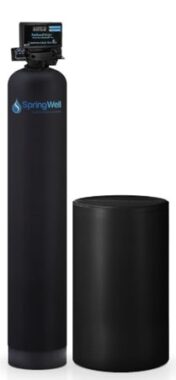Well water is safe to shower in if you have a water softener installed at your home. Untreated well water is rich in calcium, magnesium, and iron. Bathing or showering in hard well water can damage your hair, skin and make you feel itchy.
Moreover, well water can contain contaminants like coliform bacteria, volatile organic compounds (VOCs), and sediment. Hence it is important to get your well water tested at least once a year and upgrade water treatment systems accordingly.

How to make Well Water safe for Shower?
Well water is a common water source in the US. More than 40 million people use water from privately owned or community wells to meet their daily water needs.
You can make well water safe for showering by upgrading your water treatment systems. Here is a roadmap to make well water safe for showering.
Test Your Well Water: Testing your well water will identify the potential contaminants in the well water. You must test the water for coliform bacteria, hardness, pH, turbidity, VOCs, arsenic, nitrates, and sediment. EPA recommends annual testing for well water or whenever you notice a significant change in water quality (taste, odor, and color).
Install a Water Softener: Almost all homes with a water well have a softener installed. A softener uses softening salt to remove calcium and magnesium from well water and make it fit for showering and everyday use. Hard water damages your appliances, plumbing fixtures, laundry, and dishes. The white scale you see on your appliances is due to hard water.

Install a Whole House Water Filter: The next step is to install a whole house water filter to remove contaminants like iron, VOCs, dissolved solids, and odors from water. The capabilities of a whole-house filter vary from one model to another. Sometimes you may need an iron filter for your house depending on the iron concentration in well water. Removing these contaminants is vital as they can itch your skin and cause hair loss.

Install a Shower Filter: To remove any leftover contaminants; you can also install a shower filter. Shower filters are available in different sizes and shapes.

Use Skin/Hair Products made for Well Water: It is a good practice to use skin/hair products specifically for well/hard water. These products help remove mineral deposits and moisturize to keep your skin and hair healthy.
How to Shower/Bath with Untreated Well Water?
Untreated well water is safe for showering if you don’t drink it. You must also prevent well water from getting into your eyes, nose, or mouth.
Monitor children and disabled while bathing in untreated well water, so they don’t swallow it. Moreover, people with recent surgical wounds, weak immune systems, and chronic illness must never use untreated well water for showering.
Minimize bathing time to reduce exposure to harmful contaminants in untreated well water. It is also a good idea not to bathe with long soaking times as skin absorbs chemicals and contaminants quickly when contact time is more and water is warm/hot.
Can Well Water Cause Hair Loss?
Untreated well water can damage your hair and cause hair loss. However, the damage from showering in well water is not permanent, and you can reverse it in 2-3 weeks. You can also stop the damage altogether if you take the required steps to make well water safe for bathing and showering.
Can Well Water Make you Itchy?
Yes. Hard well water can make you itchy. Well water, if not softened, is rich in calcium, magnesium, and iron. Hard water doesn’t go well with shampoos, and shampoos, leave a thin deposit on your skin. The leftover deposit makes you feel itchy.
Can you get sick from Showering in Well Water?
You are safe as long as you don’t drink contaminated well water. Untreated well water may have coliform bacteria in it. Coliform bacteria can cause upset stomach, nausea, vomiting, diarrhea, or fever.
